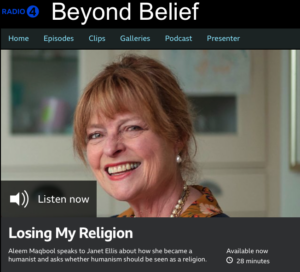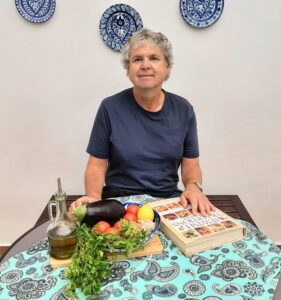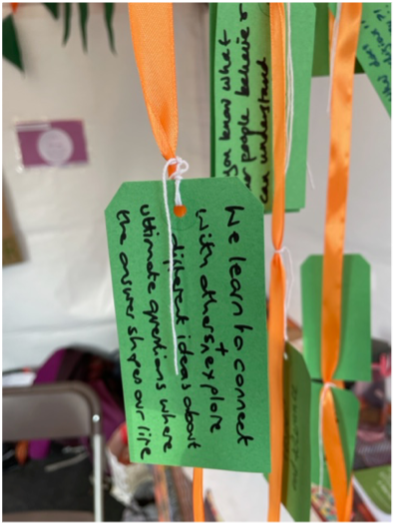From 12-19 November it is Interfaith Week! In honour of this, members of our team have taken part in a ‘share and learn’ activity that showcases a variety of beliefs.
One of the main aims of Interfaith Week is to increase awareness of the different and distinct faith communities in the UK and this has been a fun way to get our wider team involved. Let’s see what everyone’s been up to…


Barfi
Made by our CEO, Kathryn. Here she explains the meaning behind it..
I have wonderful memories of barfi. When I started work as a teacher in East London many years ago, some of the young people from many different faith and belief backgrounds would bring in barfi for staff to share. It was particularly popular at Diwali. I have never made it, but to celebrate Interfaith Week I thought I’d give it a try. It reminds me of the incredible positive interfaith relations in the Year 7 form class I was tutor of when I was began teaching. In my class we had Sunni and Shia Muslims, Hindus, Sikhs, Christians from a range of different denominations as well as those with non-religious worldviews. Some were refugees, escaping war torn areas of the world, other had lived in Newham all their lives. Yet the bonds of friendship they created were incredible, a lesson for us all, I think.
____________________________________________________________________________________________________________________________________

‘Losing My Religion’ Podcast
Tracey listened to an episode of BBC Radio 4 Beyond Belief podcast in which Janet Ellis talks about becoming a humanist – she said it was fascinating to listen to people exploring where we find values and morals.
____________________________________________________________________________________________________________________________________

Dumplings
Taylor made some homemade dumplings. Here’s what she said about them…
Dumplings hold a lot of significance in Chinese culture, particularly for those who follow the philosophy and religion of Taoism. The dumpling symbolises wealth because the shape is similar to money-related instruments such as the tael. They also symbolise prosperity and the brightness of the moon – they are commonly served during Lunar New Year to indicate the promise of a bright and prosperous year ahead.
____________________________________________________________________________________________________________________________________


Berenjena Guisada
Kevin sends a recipe; for food, or good inter-faith relations? Well, both. Muslims brought the aubergine to Andalucía, and Jews then spread their love of it throughout Europe. This Granadan dish combines both cuisines. Maimonides of Córdoba taught that sharing meals bridges cultural gaps, and that when cooking and eating, people should have a good calm attitude of spirit. The story, recipe, and thoughts of Maimonides are from Marlena Spieler’s Jewish Traditions Cookbook (London: Lorenz Books, 2005); 301. 9.
____________________________________________________________________________________________________________________________________


Middle Eastern Feast
Stacey and her family have been trying dishes from the Middle East over the past couple of weeks, both Israeli and Palestinian recipes. One day, they cooked shakshuka, and then also included typical Ashkenazi or Eastern European for dessert as well. A very multi-cultural meal!
____________________________________________________________________________________________________________________________________


Soul Cakes
Made by Kate, let’s hear her story behind these baked goods…
My children love Halloween – I have found out that lanterns, carved turnips, disguises, asking for ‘treats’ door-to-door, bonfires, candles and spooky figures like witches, skeletons and ghosts all come from the old tradition of ‘souling’. A hollowed-out turnip with a candle burning inside represents a soul in purgatory. People sang mournful for the souls of those in purgatory, and were given a ‘soul cake’ for their effort. I baked soul cakes- a buttery, spicy biscuit with raisins. They are delicious, I am tempted to give these out to trick or treaters next Hallowe’en instead of sweets.
____________________________________________________________________________________________________________________________________


Gujarati Vegetarian Meal
Claire cooked up a variety of dishes with her friend Jay who is a Gujarati Hindu…
We made a mung bean daal, onion bhaji’s, puri, poppadum’s, coriander dip and some filled chilli’s – they are some of our favourite dishes, it was so delicious! Whilst we cooked, my friend kept her Ganesh Murti – her family deity – alongside us. We thanked God for our food before eating together, then continued to share our little feast whilst talking about and sharing our faiths with one another.


